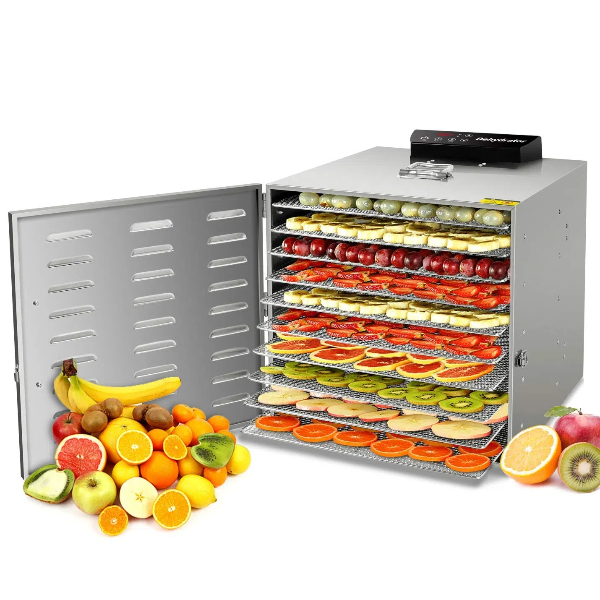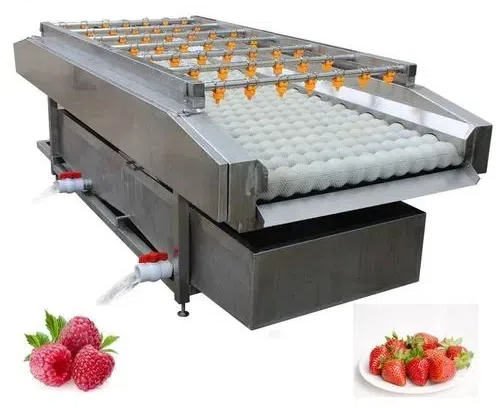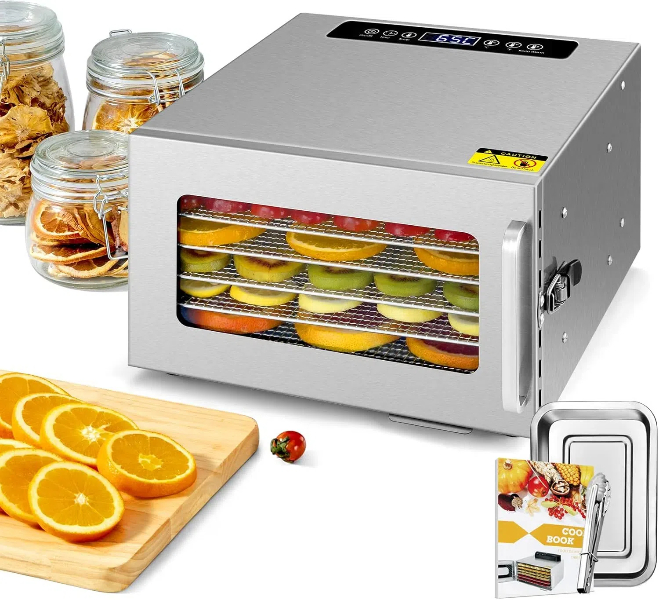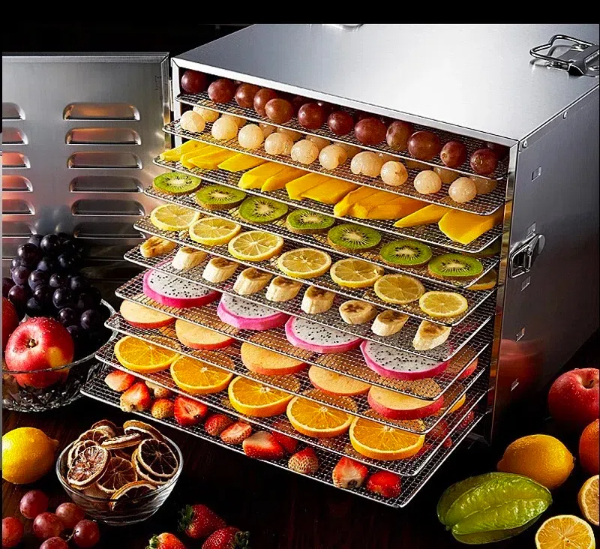
Content Menu
● Introduction: The Rising Popularity of Fruit Dryer Machines in the UK
● What is a Fruit Dryer Machine?
>> How Fruit Dryer Machines Work
● Benefits of Using a Fruit Dryer Machine in the UK
>> 1. Preserving Seasonal Bounty
>> 2. Reducing Food Waste
>> 3. Creating Healthy Snacks
>> 4. Cost-Effective in the Long Run
>> 5. Versatility in the Kitchen
● Choosing the Right Fruit Dryer Machine in the UK
>> 1. Size and Capacity
>> 2. Number of Trays
>> 3. Temperature Control
>> 4. Timer Function
>> 5. Noise Level
>> 6. Energy Efficiency
● Top Fruit Dryer Machine Models Available in the UK
● How to Use Your Fruit Dryer Machine Effectively
>> 1. Proper Preparation
>> 2. Arrange Foods Properly
>> 3. Set the Right Temperature
>> 4. Monitor the Process
>> 5. Proper Storage
● Creative Uses for Your Fruit Dryer Machine
● Maintenance and Care of Your Fruit Dryer Machine
● The Environmental Impact of Using a Fruit Dryer Machine
● Conclusion: Embracing the Fruit Dryer Revolution in the UK
● Frequently Asked Questions
>> 1. How long does it take to dry fruits in a fruit dryer machine?
>> 2. Are fruit dryer machines expensive to run in the UK?
>> 3. Can I dry meat in a fruit dryer machine to make jerky?
>> 4. How long do home-dried fruits last?
>> 5. Can I use a fruit dryer machine to make crispy vegetable chips?
Introduction: The Rising Popularity of Fruit Dryer Machines in the UK
In recent years, the UK has seen a surge in the popularity of fruit dryer machines, also known as food dehydrators. These versatile appliances have become a staple in many British kitchens, offering a convenient way to preserve fruits, vegetables, and even meats. As more people embrace healthier lifestyles and seek ways to reduce food waste, fruit dryer machines have emerged as an essential tool for the modern UK household.
What is a Fruit Dryer Machine?
A fruit dryer machine, or food dehydrator, is an electrical appliance designed to remove moisture from foods. By circulating warm air around the food items, these machines slowly evaporate water content, resulting in dried, preserved foods that can be stored for extended periods. While they're called "fruit" dryers, these versatile machines can handle a wide range of foods, including vegetables, herbs, and even meats for jerky.
How Fruit Dryer Machines Work
Fruit dryer machines typically consist of several key components:
1. Heating element
2. Fan for air circulation
3. Adjustable thermostat
4. Multiple trays for food placement
5. Vents for moisture release
The process is simple yet effective. The heating element warms the air, which is then circulated by the fan throughout the chamber. As this warm air passes over the food, it draws out moisture. The vents allow this moist air to escape, ensuring efficient drying.

Benefits of Using a Fruit Dryer Machine in the UK
1. Preserving Seasonal Bounty
The UK's climate offers a variety of seasonal fruits and vegetables. A fruit dryer machine allows you to preserve these seasonal delights for year-round enjoyment. Imagine savoring the taste of summer strawberries in the depths of winter!
2. Reducing Food Waste
Food waste is a significant concern in the UK. By using a fruit dryer machine, you can extend the shelf life of produce that might otherwise spoil, contributing to a more sustainable lifestyle.
3. Creating Healthy Snacks
Dried fruits and vegetables make for nutritious, convenient snacks. Unlike many store-bought alternatives, home-dried snacks contain no added sugars or preservatives, aligning perfectly with health-conscious lifestyles.
4. Cost-Effective in the Long Run
While there's an initial investment in purchasing a fruit dryer machine, it can save money over time. Buying produce in bulk when it's in season and on sale, then dehydrating it for later use, can lead to significant savings.
5. Versatility in the Kitchen
From creating your own tea blends with dried herbs to making pet treats, the applications of a fruit dryer machine are numerous and diverse.
Choosing the Right Fruit Dryer Machine in the UK
When selecting a fruit dryer machine in the UK, several factors come into play:
1. Size and Capacity
Consider how much you plan to dehydrate at once. Fruit dryer machines come in various sizes, from compact countertop models to larger units suitable for serious enthusiasts or small businesses.
2. Number of Trays
More trays mean more drying space. Many models offer expandable tray options, allowing you to start small and increase capacity as needed.
3. Temperature Control
Look for machines with adjustable temperature settings. Different foods require different drying temperatures for optimal results.
4. Timer Function
A built-in timer can be incredibly convenient, allowing you to set the drying time and walk away without worrying about over-drying your food.
5. Noise Level
Some fruit dryer machines can be noisy due to their fans. If you're sensitive to sound or plan to run the machine overnight, look for models known for quiet operation.
6. Energy Efficiency
In the UK, where energy costs can be high, choosing an energy-efficient model can lead to long-term savings.

Top Fruit Dryer Machine Models Available in the UK
While specific product recommendations can change over time, here are some types of fruit dryer machines popular in the UK market:
1. Stainless Steel Food Dehydrators: These durable models often feature multiple trays and are easy to clean.
2. Compact Fruit Dryers: Ideal for small kitchens or occasional use, these take up less counter space.
3. Commercial-Grade Food Dehydrators: For serious enthusiasts or small businesses, these offer larger capacity and more robust features.
4. Budget-Friendly Options: There are several affordable fruit dryer machines that offer good performance for home use.
5. Smart Dehydrators: Some newer models come with smartphone connectivity for remote monitoring and control.
How to Use Your Fruit Dryer Machine Effectively
To get the most out of your fruit dryer machine, follow these tips:
1. Proper Preparation
Wash and dry your produce thoroughly. Cut items into uniform sizes for even drying. Some fruits, like apples, benefit from a quick lemon juice bath to prevent browning.
2. Arrange Foods Properly
Place food items on trays with space between them to allow for air circulation. Avoid overlapping pieces.
3. Set the Right Temperature
Different foods require different drying temperatures. Here's a general guide:
- Herbs: 35°C to 40°C
- Vegetables: 50°C to 55°C
- Fruits: 55°C to 60°C
- Meats (for jerky): 65°C to 70°C
4. Monitor the Process
While most fruit dryer machines are set-and-forget appliances, it's good to check on your food periodically, especially when you're new to dehydrating.
5. Proper Storage
Once your foods are dehydrated, store them in airtight containers in a cool, dark place. Properly dried and stored foods can last for months or even years.
Creative Uses for Your Fruit Dryer Machine
Beyond basic fruit and vegetable drying, your fruit dryer machine can be used for:
1. Making fruit leathers or roll-ups
2. Creating your own dried herb blends for cooking or tea
3. Drying flowers for crafts or potpourri
4. Making homemade pet treats
5. Drying bread for homemade breadcrumbs
6. Creating your own backpacking or camping meals
Maintenance and Care of Your Fruit Dryer Machine
To ensure your fruit dryer machine serves you well for years to come:
1. Clean trays and the interior after each use
2. Check and clean vents regularly to ensure proper airflow
3. Store the machine in a dry place when not in use
4. Inspect the cord and plug periodically for any signs of wear
The Environmental Impact of Using a Fruit Dryer Machine
Using a fruit dryer machine can have positive environmental impacts:
1. Reducing food waste by preserving foods that might otherwise spoil
2. Decreasing reliance on commercially processed, packaged snacks
3. Lowering transportation-related emissions by allowing you to buy local, seasonal produce in bulk and preserve it for later use
However, it's important to use your machine efficiently to minimize energy consumption.
Conclusion: Embracing the Fruit Dryer Revolution in the UK
Fruit dryer machines have found a welcome home in UK kitchens, offering a blend of practicality, health benefits, and culinary creativity. Whether you're looking to reduce food waste, create healthy snacks, or explore new culinary horizons, a fruit dryer machine can be a valuable addition to your kitchen arsenal. As the UK continues to embrace healthier, more sustainable lifestyles, these versatile appliances are likely to become even more popular.
By understanding how to choose the right machine, use it effectively, and maintain it properly, you can unlock a world of dried delights right in your own home. So why not join the fruit dryer revolution and start preserving nature's bounty today?

Frequently Asked Questions
1. How long does it take to dry fruits in a fruit dryer machine?
Answer: Drying times can vary depending on the fruit and its water content. On average, most fruits take between 6 to 16 hours to dry completely. Berries and thinly sliced apples might dry in 6-8 hours, while denser fruits like pears or peaches could take 10-16 hours.
2. Are fruit dryer machines expensive to run in the UK?
Answer: While fruit dryer machines do consume electricity, they are generally not considered expensive to run. Most home-use models consume between 200-1000 watts per hour, similar to a computer or a small microwave. The exact cost will depend on your machine's wattage and your electricity tariff.
3. Can I dry meat in a fruit dryer machine to make jerky?
Answer: Yes, many fruit dryer machines are versatile enough to handle meats for making jerky. However, it's crucial to follow food safety guidelines. Ensure your machine can reach the necessary temperature (usually around 65°C to 70°C) to safely dehydrate meat.
4. How long do home-dried fruits last?
Answer: Properly dried and stored fruits can last 6-12 months. For best results, store dried fruits in airtight containers in a cool, dark place. If you notice any signs of moisture or mold, discard the affected pieces immediately.
5. Can I use a fruit dryer machine to make crispy vegetable chips?
Answer: Absolutely! Fruit dryer machines are excellent for making crispy vegetable chips. Thinly slice vegetables like kale, beetroot, or sweet potatoes, season as desired, and dry them until crisp. This usually takes 6-8 hours, depending on the vegetable and your machine's settings.












